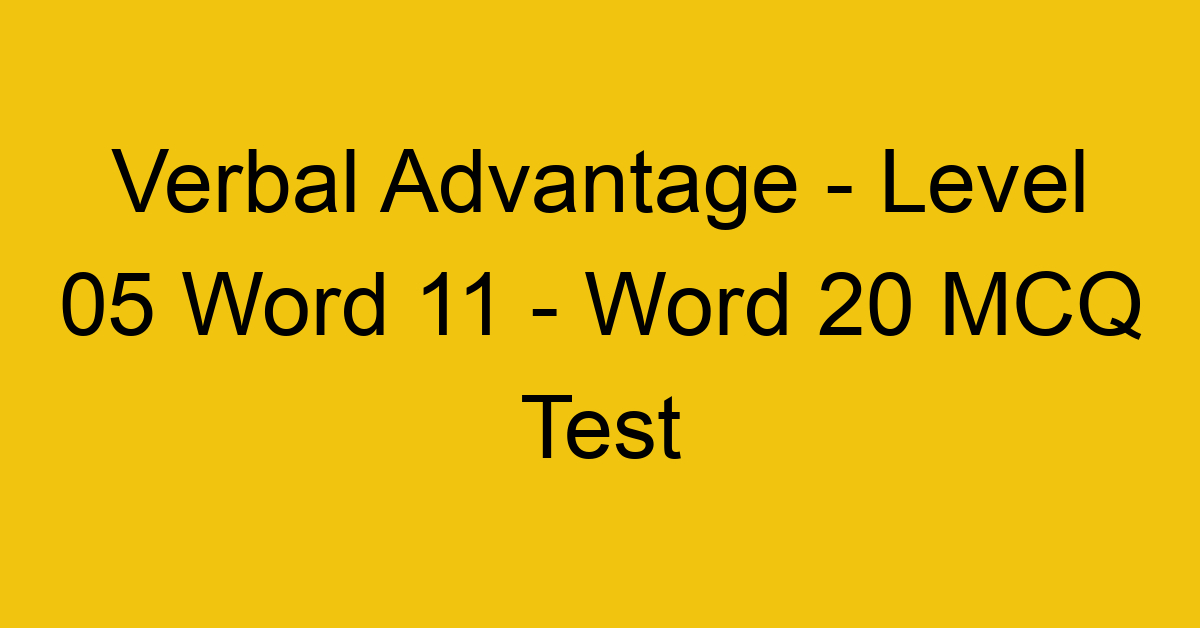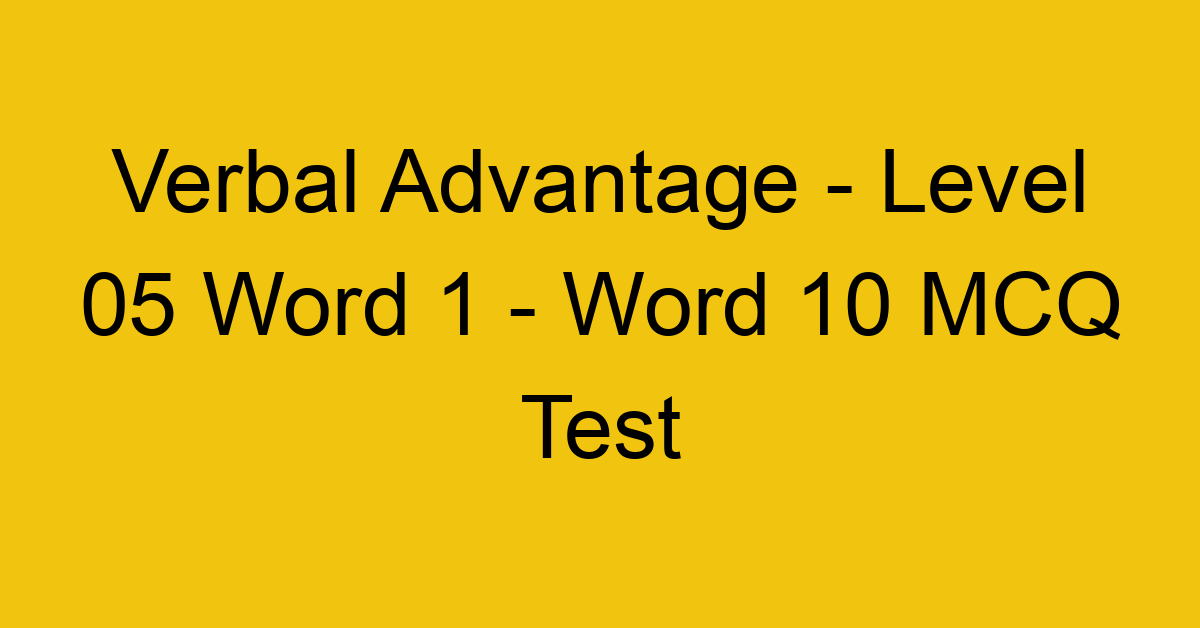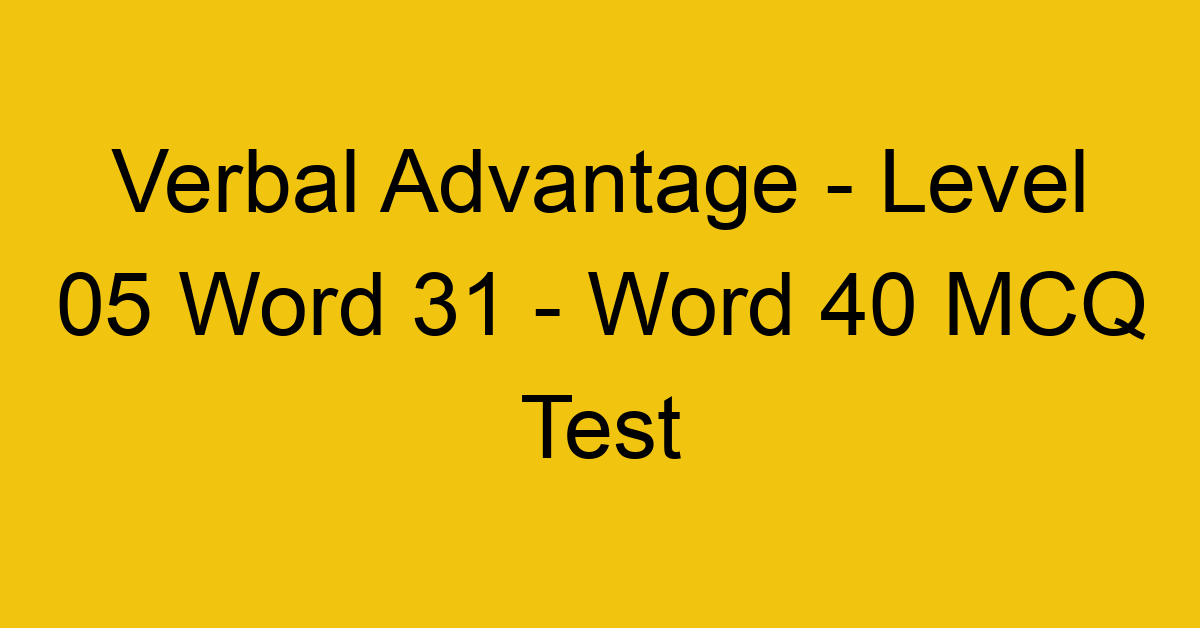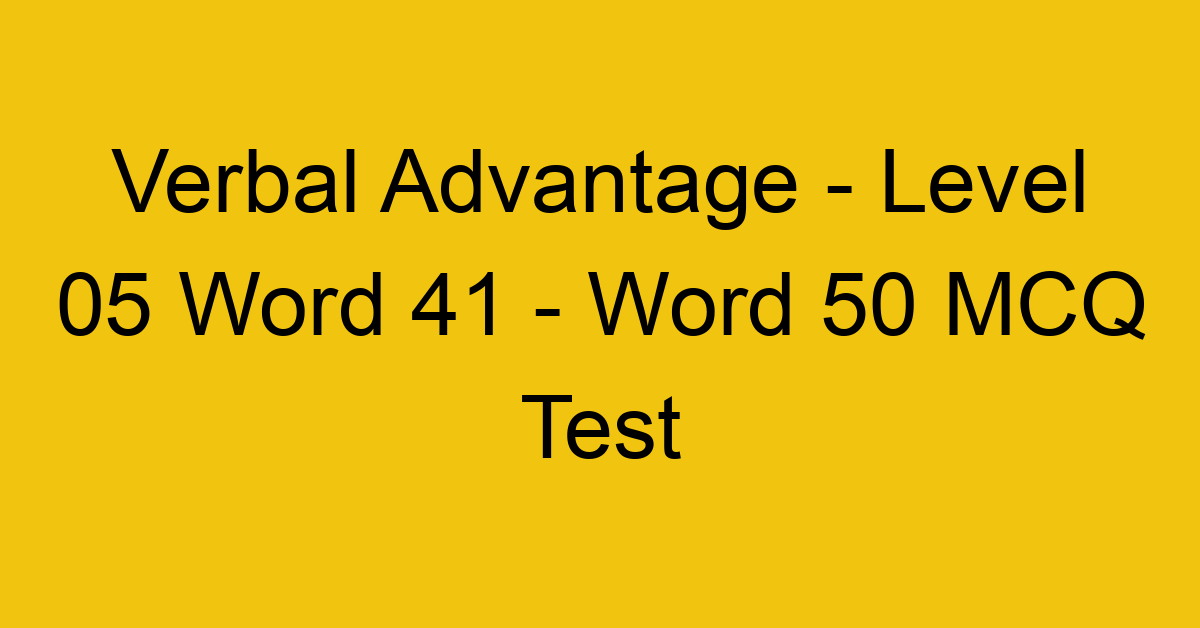Verbal Advantage - Level 05 Word 21 - Word 30 MCQ Test
Word List
- Word 21: Ebullience [i-BUHL-yints or i-BUUL-yints]
Lively enthusiasm, high spirits, bubbly excitement.
→
Synonyms include exuberance, exhilaration, and effervescence (EF-ur-VESints).
The words ebullition (EB-uh-LISH-in), ebullient (i-BUHL-yint or iBUUL-yint), and ebullience all come from the Latin verb ebullire, to boil, bubble.
The noun ebullition literally means a boiling or bubbling up. It may be used figuratively of an emotional outburst, as “Lisa was delighted with her husband’s amorous ebullition on their anniversary.”
The adjective ebullient means bubbling with enthusiasm, overflowing with high spirits: “The stadium was packed with thousands of ebullient fans.”
The noun ebullience means bubbly enthusiasm, seething excitement, irrepressible exuberance: “When Jack won the lottery, he could not contain his ebullience.”
Ebullience and ebullient are often mispronounced. Don’t say iBOOL-yints and i-BOOL-yint, or i-BYOO-lee-ints and i-BYOO-leeint. The BOOL and BYOOL sounds (which rhyme with fool) are wrong. Also, take care to eschew (es-CHOO, remember?) the sloppy mispronunciations EB-yuh-lints and EB-yuh-lint, which move the stress to the first syllable.
In ebullience and ebullient, the stress should fall on the second syllable, -bul-, in which the u may have the sound of the u in bulk or bull.
- Word 22: Impervious [im-PURV-ee-us]
Impenetrable, incapable of being entered or passed through; hence, unable to be moved or affected by something.
→
Synonyms of impervious include impassable, impermeable (imPUR-mee-uh-bul), and opaque (oh-PAYK). Antonyms include penetrable (PEN-i-truh-bul), passable, accessible, permeable, translucent (tranz-LOO-sint), and diaphanous (dy-AF-uh-nus).
An impervious substance cannot be penetrated: certain fabrics are impervious to water; a recording studio must be well insulated and impervious to external noise. If you are impervious to pain, then pain does not penetrate your consciousness. And if your mind is impervious to reason, that means you cannot be moved or affected by any argument, no matter how persuasive.
- Word 23: Remonstrate [ri-MAHN-strayt]
To object, protest, reprove, rebuke, argue or plead against.
→
To expostulate (ek-SPAHS-chu-layt) and to remonstrate are close in meaning. To expostulate suggests an earnest and sometimes passionate attempt to change someone’s views or behavior by pleading and argument. To remonstrate suggests a calmer and more reasoned attempt to show that someone is wrong or blameworthy.
- Word 24: Efface [e-FAYS]
To rub out, wipe out, obliterate, erase, expunge: “Time gradually effaced the memory of the tragedy.”
→
To efface may also mean to make oneself inconspicuous, keep oneself out of the limelight: “During the celebration, he effaced himself so his partner would get all the attention.” The selfeffacing person stays in the background and behaves in a modest, retiring fashion.
Take care to distinguish the words deface and efface. To deface means to spoil the appearance of, ruin, disfigure, mar. To efface means to rub out, wipe out, erase, or to withdraw from notice, make oneself inconspicuous.
- Word 25: Chimera [ky-MEER-uh]
A foolish fancy, fantastic notion or idea, figment of the imagination.
→
Synonyms of chimera include whimsy (WHIM-zee), crotchet (KRAHCH-it), maggot, and caprice (discussed in word 11 of Level 1).
In Greek mythology, the Chimera was a fire-breathing monster with the head of a lion, the body of a goat, and the tail of a serpent. In modern usage chimera may refer to that monster or a similar fabulous creature, but more commonly it means an absurd and fabulous creation of the mind. A chimera is a vain or idle fancy, an impossible or visionary idea. The corresponding adjective is chimerical (ki-MER-i-kul), which means imaginary, fantastic, preposterous, absurd.
- Word 26: Incorrigible [in-KOR-ij-uh-bul or inKAHR-]
Bad beyond correction or reform, hopeless, irreformable; also, unruly, unmanageable, difficult to control.
→
Synonyms of incorrigible in the sense of “bad beyond correction or reform” include irredeemable, irreclaimable, unrepentant, inveterate (in-VET-uh-rit), and unregenerate (UHN-ri-JEN-uh-rit).
Synonyms of incorrigible in the sense of “unruly, difficult to control” include obstinate (word 34 of Level 1), willful, and intractable (word 12 of this level).
The adjective corrigible means “capable of being corrected, amended, or reformed.” By adding the privative (PRIV-uh-tiv, meaning “depriving” or “canceling”) prefix in-, meaning “not,” to the adjective corrigible, we get its antonym, incorrigible, not capable of being corrected, amended, or reformed—and therefore hopelessly bad, irreformable, as an incorrigible drinker, an incorrigible practical joker.
Because incorrigible behavior cannot be corrected or reformed, it also cannot be managed or controlled, and from that logical inference grew the second meaning of incorrigible: unruly, unmanageable, difficult to control. Wild, unruly teenagers and spoiled children who will not mind their parents are often called incorrigible.
- Word 27: Juxtapose [JUHK-stuh-POHZor JUHKstuh-pohz]
To place side by side or close together, especially so as to compare or contrast.
→
The first half of the word juxtapose comes from the Latin juxta, which means “near, close by.” The second half, -pose, comes from the Latin ponere, to put, place, the source also of the familiar word position and the more challenging word posit (PAHZ-it). To posit means to put forward as true, set down as a fact, as the Declaration of Independence posits that “all men are created equal.” By derivation the verb to juxtapose means “to place near, put close by.”
When you juxtapose two or more things you place them side by side, usually for the purpose of comparing or contrasting them. Painters often juxtapose colors for a striking effect; philosophers and scientists juxtapose ideas so as to evaluate them; a consumer might juxtapose two products, place them side by side, to decide which one is better.
The corresponding noun is juxtaposition (JUHK-stuh-puh-ZISH-in).
- Word 28: Conversant [kun-VUR-sint]
Familiar, acquainted, well-informed or well-versed.
→
Conversant comes from the Latin conversari, to associate with, the source also of the verb to converse and the noun conversation. When you are conversant with something you have had a conversation with it; you have associated with it, and therefore you are familiar or well acquainted with it. The person who is conversant with astronomy or folklore or Russian history or the microcomputer industry is well informed and able to speak knowledgeably about the subject.
Conversant and versed are close synonyms. Conversant is usually followed by with; versed is usually followed by in. Versed often suggests the familiarity that comes from experience. You can be versed in the ways of life, versed in the techniques of marketing or public relations, or versed in the culture of a foreign country. Conversant often suggests the familiarity that comes from having studied something or acquired information about it. You can be conversant with the work of a certain writer, conversant with economics, conversant with modern art, or conversant with current events.
- Word 29: Esoteric [ES-uh-TER-ik]
Intended for or designed to be understood only by a select group, known only by a few people; hence, not public, secret, confidential.
→
Synonyms of esoteric include mysterious, impenetrable, inscrutable (word 48 of Level 3), cryptic (KRIP-tik), abstruse (ab-STROOS, word 5 of Level 6), arcane (ahr-KAYN), and recondite (REK-undyt).
Antonyms of esoteric include plain, apparent, accessible, manifest, discernible (word 32 of Level 3), lucid (word 45 of Level 3), and perspicuous (pur-SPIK-yoo-us).
Esoteric comes from a Greek word meaning “inner,” and by derivation means intended for or known only by an inner circle. According to the 1914 edition of the great Century Dictionary, the word esoteric “originally applied to certain writings of Aristotle of a scientific, as opposed to a popular, character, and afterward to the secret…teachings of Pythagoras; hence, [esoteric has come to mean] secret; intended to be communicated only to the initiated.”
Because esoteric refers to that which is secret or understood only by a few select people, in recent years the word has come to be used more generally to mean beyond most people’s knowledge or understanding, highly complex and difficult to comprehend, as an esoteric theory or the esoteric language of computer programming.
Many educated people now use the word in this more general way, and there is nothing wrong with that—except that I suspect most people who use esoteric today are not aware of the word’s original, more specific meaning. Thus, you will have a leg up on them if you keep in mind the precise meaning of esoteric: intended to be communicated only to the initiated.
An esoteric theory is complex and impenetrable because it is designed to be understood only by a select group. An esoteric purpose is secret and mysterious because it is known only by a few chosen people.
The antonym or opposite of esoteric is exoteric (EKS-uh-TER-ik). Exoteric begins with the prefix exo-, which means “outer, outside.” Exoteric means external, popular, of the outside world or open to public view. Exoteric writing is intended for the world at large; it is communicated to or suitable for the general public. Esoteric writing is intended for an inner circle; it is understood only by a few people.
- Word 30: Auspicious [aw-SPISH-us]
Favorable, fortunate, marked by favorable circumstances or good fortune, conducive to success, boding well.
→
The ancient Romans were, by modern standards, a highly superstitious people who believed in supernatural signs and omens and who often consulted oracles, astrologers, clairvoyants (klair-VOY-ints), and soothsayers (the sooth- rhymes with truth) when they wanted to know what the future held in store for them. One of the most popular fortune-tellers in ancient times was the auspex (AW-speks), who practiced a form of divination known in Latin as auspicium, which meant the act of predicting the future by observing the flight of birds.
In English, the word auspice (AW-spis) means an omen or sign, especially a favorable one. From that sense auspice came to be used in the plural, auspices (AW-spi-siz), to mean protection, guardianship, or sponsorship, as an investigation conducted under the auspices of the government. Both the noun auspice and the adjective auspicious come from the Latin auspicium, which in turn comes from avis, bird, and specere, to look at, observe. By derivation auspicious refers to that which an auspex, or birdwatcher, has said will have a favorable outcome.
In modern usage auspicious applies to anything marked by favorable circumstances or good fortune. An auspicious debut is a favorable debut, one conducive to future success. When the telephone rings and the caller wants to buy your product or pay for your services, that’s an auspicious call, one marked by good fortune. And when you meet someone at a party who later turns out to be an important business contact, that meeting can only be described as auspicious, favorable, fortunate.
The adjectives auspicious and propitious (pruh-PISH-us) are close in meaning. Propitious by derivation means rushing forward or striving after something—in the vernacular (word 15 of this level) or in colloquial (word 43 of this level) terms, “going for it.” In current usage propitious usually refers to favorable conditions or a favorable time for doing something: fishermen hope for propitious weather; stockbrokers are always looking for the propitious moment to buy or sell. Auspicious means favorable in the sense of boding well, giving indication of success. An auspicious event is one that seems an omen of success, good fortune, or prosperity.






